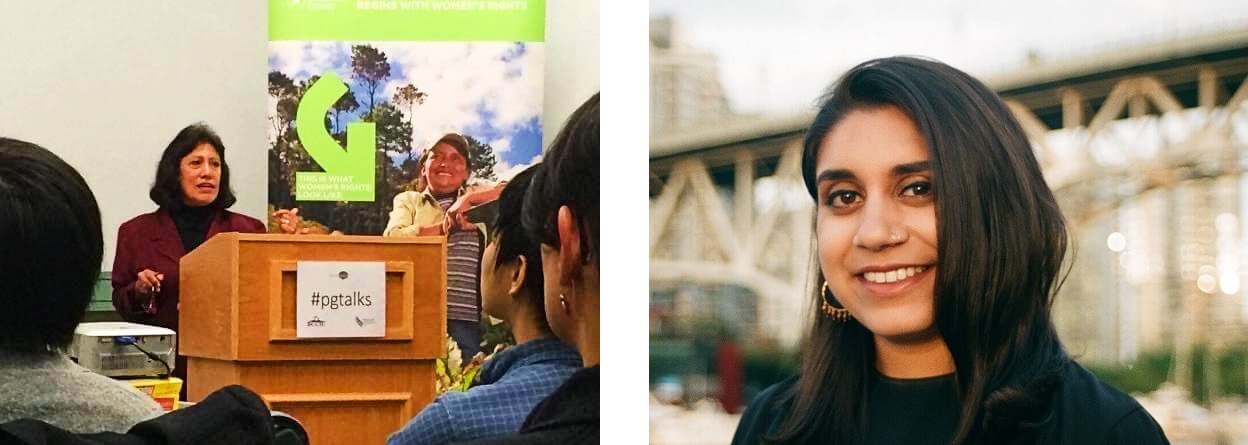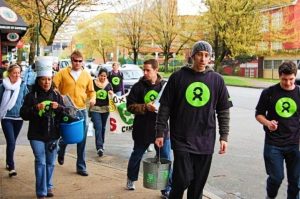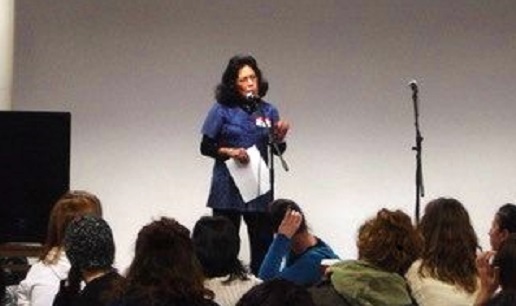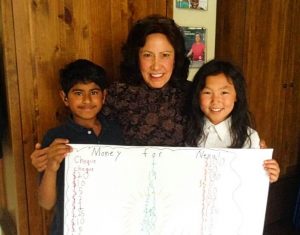A personal stake in participation: Learning to mobilize for change at home and globally
Social justice. Fighting to end inequality. The fair treatment of all people in a society and an equitable distribution of resources for all. How has Oxfam Canada worked in this space? What’s been the impact and what does that landscape look like now?
Meet Miriam Palacios and Amar Nijhawan. Two women who share a passion for advocacy and their work in the social justice arena but are from different generations, different cultural and racial backgrounds and different personal and professional experiences. Their similarities married with their differences paint a picture of the social justice movement in Canada and Oxfam’s role in supporting that work.
In this conversation, Palacios brings her experience to the table as not only a former public engagement and campaign officer for Oxfam Canada but also as a tireless human rights activist and advocate based in British Columbia. She has helped educate and organize people in Vancouver on issues related to human rights, women’s rights, and food and trade. Nijhawan, who is currently a women’s rights knowledge specialist at Oxfam Canada with a decade’s worth of experience as a gender and policy specialist, program manager and researcher, brings her fresh perspective and unique lens to the conversation.

Miriam Palacios (left) and Amar Nijhawan (right), represent two generations of Oxfam Canada and are two women who share a passion for advocacy and social justice work.
Q: Oxfam is known by many people as an organization that works overseas to fight inequality and poverty in the world's poorest communities. How have you explained to people over the years that there is a role for Oxfam fighting poverty and inequality in Canada as well?
Miriam: I worked for Oxfam Canada for over 30 years. I came to Canada as a political refugee from Guatemala and somehow, even before Oxfam hired me, I was connected to the organization. I was highly involved in communities before working with Oxfam. People in Canada saw me as a refugee, who came from a developing country – that was war torn, had poverty, inequality and injustice. But surprisingly when I arrived in Canada, to this incredible rich country – it seduces you with all its wealth and development, which was very contrary to the areas I was coming from. But I learned quickly there were a lot of social and economic issues in this country as well.
There were links coming from a developing country and seeing some of the same injustices I was confronting in my country. Canada clearly had poverty at the time I arrived in the country. Food banks were trying to develop; people were trying to understand how they worked. But they didn’t see it.
When I would talk to people, they would look at me as the person who came from poverty – a single mother (at the time) with two children, trying to survive. I have always been outspoken and taken a leadership role, so the way I used to try to get through to people here was acknowledging the poverty and war happening in Guatemala but also point out the injustices happening in Canada. There’s poverty and people suffering, there are single mothers going to the food banks looking for food right here in Canada.
I would make clear connections between what's happening in developing countries and in Canada and why we needed to change these at both levels. It’s not enough to just give to other countries without making the changes here at home.
Because sometimes I’d get ‘oh yeah, that's only affecting people in developing countries… people in Bangladesh can live on 12 cents an hour because it’s cheap.’ And that's not the case. People really have to be able to understand that 12 cents in Bangladesh would be equivalent to $12 here in Canada – and people cannot live on that.
Through my connections in the trade union movements and women’s organizations, I was able to bring immigrant women, who were working in factories here, to tell their stories. I not only brought my voice, which to be honest in many aspects people didn’t respect because I was a Guatemalan and a person of color. But it didn’t stop me. I wanted people to know that it was not only me, that it’s people from everywhere else too.
Amar: For me, it's been really interesting joining Oxfam as an organization that's committed to tackling inequalities in Canada and internationally during this pandemic. Because I feel COVID-19 has really shown us that inequalities exists in so many different contexts.
They've heightened and exacerbated inequalities and what we're seeing and experiencing in Canada in terms of how many women have dropped out of the workforce this year… it isn't much different from the same levels of labor force participation rates that have dropped across the world.
Q: What progress have you seen on social justice issues over the last few decades?
Miriam: The social movements of women, youth, climate change, women’s rights organizations and racial organizations – there’s an incredible plethora of them that have made some clear and concrete changes. One example – when you look at fair trade coffee and goods in this country – back in the 80s when I started – no one knew what it was or what it was about. Now, everywhere you go in Canada, you can barely find a coffee shop or store that doesn't have fairly traded coffee and goods.

Miriam walks with Oxfam volunteers to bring awareness to climate change and women's rights.
Even during this time of the pandemic, people are still fighting for global justice, for women’s rights, for racial rights. While there is concern on these movements not working together, there is still an incredible amount of mobilization taking place – and that, I think, is the most important thing. When I worked with Oxfam Canada, I was always making sure that Oxfam was integral in these incredible movements that were taking place because we had the incredible capacity of connecting our local movements to regional, national and international. And that was, to me, one of the incredible strengths that we were always able to bring to the country.
Amar: Adding to what Miriam said – movements are doing the work. They have been doing the work and been at the backbone of a lot of progressive initiatives and policies as much as they were 30, 50, 100 years ago – as much as they are right now. I think one thing I'm seeing evolve is not only the uptake of this movement work in the everyday population, but how governments are now responding using language. They’re using progressive trade language in their policies and rhetoric.
Whether that rhetoric or policy is transformed into instrumental change is something that's yet to be seen and I think is the role of the movements to keep holding these spaces accountable.
For instance in spaces where you would never hear the word feminist be uttered, you now have a Feminist International Assistance Policy (FIAP) in the last four years. And again, not to say that an uptake of language is necessarily delivering the results the same way but I feel that movements have been so crucial into normalizing and mainstreaming a lot of these concepts and ideas.
Q: What does international – national collaboration look like in support of social justice?
Miriam: 30 years with Oxfam – there’s been an incredible range of organizations [that I collaborated with]. In the 80s, it was work with all the trade union movements, women’s organizations, churches in the beginning were working in solidarity and support of Central America liberation movements and against apartheid in Africa. That was where things started for me at Oxfam.
Some of the issues we worked on was supporting liberation movements/labour rights, both in Latin America and Africa. It gave us an opportunity to make a lot of the connections in terms of looking at the role of women, their working conditions, and inequality.
I also worked in the sector developing links and connection between groups, which I was doing before I joined Oxfam. I took a delegation of different BC women’s organizations to Central America to connect – sector to sector, women to women, doctors to doctors, nurses, to nurses, and lawyers to lawyers. It was an incredible plethora of different sectors linking up and helping each other.
So depending on the issues, I was always able to connect with many different sectors to mobilize and work on changing policies.
Amar: I’m still relatively new to Oxfam but for me, a lot of these big global organizations are coming together to realize the problems within our country but they need to be brought out on the multilateral stage. I'm really happy to be participating. A part of my work is following the Beijing+25 process, the generation equality forums and the commitments that are coming out this year. There's such an amazing network of Canadian women's organizations that are not only trying to push the agenda within these blueprints for actions in a global space. But also actively mobilizing around – ‘now that we have this new set of sustainable development goals for the women's sector, how do we start putting the pressure on the Canadian government domestically to start adopting some of those as well?’
Q: What keeps you up at night when you think about the social justice movement in Canada or globally, and what in your view are the biggest barriers to making change?
Miriam: There are two components to that question. One is the realization that despite the incredible strength of the movements and the fact that we continue advocating and influencing on many different levels, poverty and inequality still persist. And the other part is seeing how often our sector changes priorities, which is concerning to me. I noticed that depending where the funding is coming from – we need to change priorities or programs or campaigns. To keep our partners and movements going and sustainable, you need to know where the money is going to have real impact in the long-term. Especially since we know that every two or three years, the government changes their priorities – which means we have to change.

Miriam Palacios, a former public engagement and campaign officer for Oxfam Canada and a tireless BC-based human rights activist and advocate, speaking in 2005.
Amar: I'm always concerned about burnout in a lot of these movements. Doing movement work is really difficult. Working in the INGO and nonprofit sector, which is chronically underfunded in Canada, is also really difficult. So how do we keep applying that pressure and momentum without becoming discouraged? How do we gain every inch that's made in the right direction – how do we ensure that it's leading to a transformative change?
[On identifying challenges] I think there are a lot of systems at play. The economic system we live in right now is clearly not working for us. I think a lot of the fundamental inequalities we see everywhere stems from that economic inequality that governments top up. We can add billions of dollars into entrepreneurship and labour market strategies, but you can't entrepreneur your way out of structural poverty.
It’s like we're happy governments are responding to these critical issues, but a lot of these critical issues are there because of capitalism and these structures need to be addressed at the root cause. A lot of communities have been doing work around norm changing and bringing to attention these issues for a very long time. We need to fund and listen to them.
Q: You hear people talk about ‘apathetic youth’ - what role have you seen youth, young activists and volunteers play in social justice work?
Miriam: It was huge and a very strong part of my agenda. But it was not only the youth, it was also the engagement of volunteers. I went to schools to talk with teachers, to organize students and tell them what needed to be done. And the last effects are concrete. I had one high volunteer who became a member of the Oxfam board. And now he's a doctor and continues to be an incredible activist. And many of those I used to know are continuing to work for change with some now working at the government level.

Miriam stands with two young students from an elementary school in B.C., who have collected money for an Oxfam emergency in Nepal.
Amar: As someone who was introduced to Oxfam in university, I spent so much of my time outside of class, participating in campaigns and organizing things. So I’d say there’s no youth apathy. The generation that Miriam inspired, my generation, are the ones that are now doing these jobs and roles and running for politics. I also look to the generation below me, and I know the kids on TikTok are going to teach us more than anything we’ve seen today. People's heightened awareness of injustice, systems of oppression, not taking things for face value, and questioning a lot of the sexist norms we grew up with.
I don't see the youth as apathetic, I feel they are getting more political in different means and ways. They're pushing boundaries and forcing people to confront things and challenging opinions.
Q: In conclusion, what role do you think Oxfam plays in supporting grassroots social justice struggles in Canada?
Miriam: I think that the role has always been clear – advocating for social change, being a strong part or member of the different movements. Making sure all the people from the grassroots have opportunities. To not only provide donations, which is a very important part of the work, but also contribute by making changes, advocating where they can by social media, meeting their MPs or writing letters. Essentially, giving them a very personal stake in participation. And continuing to make the links between poverty, women rights, climate change and all the inequalities that exist.
**This conversation has been edited and condensed.

